
Deciding on a topic for the first Writer@Work article I was spoiled for choice in taking my lead from the various whinge-worthy subjects penned by some of our favourite columnists. Needless to say, it had to be something empathic … even though I find myself increasingly at odds with the social intolerance revealed by my fellow readers and adherents of the woke- culture. Woke nowadays refers to being aware or well informed in a political or cultural sense, especially regarding issues surrounding marginalised communities - it describes someone who has “woken up” to issues of social injustice – even to the point of exploiting them to self-serve a journalistic purpose.
That said, I can’t confess to a deprived childhood although growing up in a war-time culture of rationing and ‘left-overs’ recipes has set me up for dealing with modern sky-rising costs of living. I managed to get through school despite suffering from latently discovered dyscalculia – a condition that affects the ability to acquire maths skills. Death in various forms has robbed me of a succession of dearly-loved two and four-legged family members; and I’ve ‘survived’ a personal encounter with breast cancer – none of which I’ve ever felt the urge to share with the reading public.
Not to mention regular incidents of bullying and sexual harassment both of which were dealt with at different stages following a crash course in martial arts. Any temptation to be part of the ‘sister-hood’ was cured by discovering that it included eliminating 50% of the opposition (and me brought up in a boy-scout troop!) - and that in standing up as a defender of justice meant I was on a hiding to nothing in coming forward as a police witness to an assault on one of the boys in blue!
Journalists are constantly under pressure to find topics that strike an empathic cord with their readers and the best among them are known for throwing in the odd, pithy comments that get their critics spitting feathers. Top of the heap is Brendan O’Connor who, for me, manages to tell it like it is/was:
“Does it count as empathy if you learn it the hard way?” he wrote. “Is there anything noble in gaining an understanding of other people’s lives only because your own life becomes another person’s life? Is that empathy? Or is that cheating? … I made it through school without knowing anyone gay. But it would be college before I met anyone who was gay ... I knew one guy who was Egyptian. One brown guy. There was nobody black. Nobody in school, nobody in the area. We grew up with people like us. And we just assumed everyone was like us ...”
Nowadays, if I’m honest I’m bored to death of always having to be careful to express the right sympathies, of always having to say the right things whenever I’m confronted with one of life’s self-appointed victims. In later years those friends who happened to be black/gay didn’t have the obsession about turning every conversation towards their minority issues.
Ciara Kelly GP, broadcaster and award winning columnist isn’t afraid of controversy either, and has received her fair share of media hate as a result – including death threats. She is aware that the media and public are fickle beasts but had the courage to say in her column that one story that shouldn’t be allowed to fall off the agenda is the sexual assaults and rapes of hundreds of children by the clergy that is continuing to unfold.
I was more involved on the periphery of the ritual abuse scandals of the 1980-90s that focused its attentions on the pagan community. Anti-occult hyped material still provides more interesting reading than serious esoteric writing, especially if the authors have a religious bias. The ‘satanic child-abuse’ scare, which lasted for five years, was formulated and fueled purely on deliberately inaccurate scaremongering of Christian fundamentalists and over-zealous social-workers. The intensive investigation the Government-commissioned report by Professor J D La Fontaine (The Extent & Nature of Organised and Ritual Abuse – HMSO) confirmed that there was no foundation for any of the allegations but the media still continues to lambast witchcraft whenever the opportunity arises.
Some even dismissed Social Services’ dawn roundups of children as none of their concern, because the majority of cases did not affect anyone with genuine pagan involvement because they thought whatever happened wouldn’t affect them. Several pagan publications of the time even stated that as far as they were aware, there had been no cases of pagan children being taken into care ‘because of allegations of ‘satanic child-abuse, nor even of any otherwise unprovoked investigations’. This was incorrect – there had been cases of pagan children being taken into care and several parents lost custody cases because of their pagan beliefs. In fact, the authorities had successfully gagged parents by lawful process, which prevented any of them from contacting professional organizations for help and this was why no details surrounding the cases were made public. And the media story disappeared overnight!
Dr Kelly’s column reveals that this current clerical abuse scandal also involved a legal strategy that protected the perpetrators and paid the legal fees of priests who couldn’t afford to pay themselves. “There is no credible way that so many men all living in close quarters with this sick predilection for preying on children, some of whom were abusing the same boys, didn’t know about each other. They covered it up. They moved priests around, enabling them to abuse others. They fought cases tooth and nail.”
Neither event should ever allow the public or the judiciary in either the UK or Ireland to allow us to forget about these cases. Seventy-seven priests accused so far of raping or assaulting 300 people; whereas there was ‘no foundation for any of the allegations’ of pagan ritual abuse but both have had their fair share of casualties that people quickly forget about. Nevertheless, both sides of the religious divide have suffered … but these are casually brushed aside if they make uncomfortable reading.
Fortunately, Ireland never really had a problem with ‘witch trials’ because in the Gaelic-Irish tradition so many people’s spiritual outlook was tied into the fairies, or the sidhe as they are known – even down to the present day. A large percentage of the population accepted as a matter of fact that the sidhe (pronounced ‘shee’) were real and influenced the world around them. So while the idea of the witch who was in league with the devil was flourishing elsewhere, in Ireland it just didn’t take hold.
According to Dr Gillian Kenny at Trinity College, people encountered events they interpret as being supernatural they happily attributed them to the faerie, so there was no need to blame witches. People were obsessed with the wise women who lived in th community and who had knowledge of how to keep them away, she says. The average person either believed in the sidhe or hedged their bets to be on the safe side. Dr Kenny points out that, even today many people still refuse to build on a fairy fort for example, or to cut down a hawthorn tree.
So, all in all, I’ve not had an uneventful life and close friends have helped me through the sticky bits … but I’ve never felt the need to belong to any ‘Me-Too’ - type community club and get a merit badge. Or as a my good chum Sheila, has always said: “Get a grip and sort it!”

 RSS Feed
RSS Feed